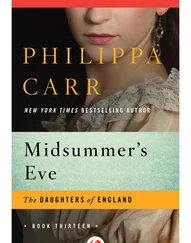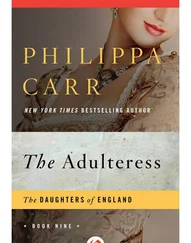At Cador there was a picture gallery, and the portrait which was of greatest interest to me was that of my grandfather. As he looked down on me his eyes seemed to follow me wherever I was in the gallery and I could fancy his face changed as he watched. It was a clever portrait, I suppose, because one had the impression that at any moment he was going to step out of the frame. He was dark; there was a great strength in his face; his mouth seemed to turn up at the corners as one watched and there was a twinkle in his eyes. He looked as though he thought life a great joke.
My mother discovered my interest in the picture.
“You are always gazing at it,” she said.
“It seems as though he is really there. The others are just paintings. He looks alive.”
She turned away; I knew she did not want me to see how moved she was.
Then she said: “He was a wonderful man. I loved him … dearly. When I was young he was the most important person in my life. Oh, Angel, how I wished you could have known him! I sometimes think that our lives are planned for us. He had to die young. He could never grow old. He had lived adventurously, violently even … and then he came to peace with the family he loved dearly … my mother, Jessica, Jacco and me.”
She stopped, too emotional to go on.
I slipped my arm through hers.
“Let us not look at him, Mama,” I said, “if it hurts you.”
She shook her head. “If he were here he would laugh at me. He would tell me not to grieve. She went with him … my mother … and Jacco too. They all went. They left me alone. Even now … I remember it so vividly. I can never forget … even now I think of that day when they went away and never came back.”
She told me the story of grandfather Jake Cadorson. “This was his home. He had an elder brother who was the heir to the Cador estate. They didn’t get on well together. Jake left home and lived with the gypsies.”
“He looks a little like a gypsy.”
“It was in his nature. He was never afraid of life. He challenged life and life met the challenge … and won in the end. When he was living as a gypsy he killed a man. The man was some aristocrat who had attacked one of the gypsy girls. Jake sought to save the girl. There was a fight and during it he killed the man. He was transported to Australia for seven years. He would have been hanged for murder if your grandmother Jessica had not prevailed upon her father to do all he could to save him. Her father was a very influential man. And so … the punishment was transportation to a new land for seven years which was considered a slight punishment for killing a man.
“While he was away his brother died and he inherited Cador. He returned to England and married your grandmother. My brother Jacco was born and then I was. We were a very happy family. Then we went to Australia. Jake had prospered there when his seven years’ term was up and he had some land there. It was while they were in Australia that he went sailing on that terrible day … he, my mother and Jacco. They never came back.”
“Don’t talk of it.”
“It affects me … even now. It seems so clear.”
I put my arm round her. “Never mind. You have Papa and us now … Jack and me.”
She held me tightly. “Yes. I have been lucky. But I can never forget it. We were all together … and then … no more. That is how life goes sometimes. One must be prepared.” She kissed me and said: “I should not be sad. There were so many happy times with them. I must remember those instead and be grateful for those times. And now I have your father and you and Jack.”
When I had heard the story of my grandfather, I came more often to the gallery to look at him. In those daydreams of mine I projected myself into the years long ago before I was born. I was a gypsy riding in the caravan with him. I was on the ship which carried us overseas. I was with him on the fateful day when they went sailing. I rescued them all and there was a different end to the story. My grandfather had a prominent place in my repertoire of dreams.
Then came the day in early April. It was spring and Jack was in the garden with Amy, our nursery maid, and I was with them when my parents came out.
Jack ran to my mother and clutched at her skirts. She lifted him up. Then she smiled at me. “We’ve heard from your Aunt Amaryllis.”
Aunt Amaryllis wrote frequently. She liked the family to keep in touch, and she had always felt she must look after my mother since the death of my grandmother in that fatal incident in Australia; for Amaryllis and my grandmother Jessica—although they were of an age—had been brought up together.
“She’s excited about the Exhibition,” said my mother. “The Queen is going to open it on the first of May. She suggests we ought to go up to see it. It is some time since we visited.”
I gave a little jump of joy. I loved visiting London.
“There seems to be no reason why we should not go,” said my father.
“I’m going too,” announced Jack.
“Of course you are, darling,” said my mother. “We shouldn’t dream of leaving you behind, should we?”
“No,” replied Jack complacently.
“It will be exciting,” went on my mother. “They’ve been months planning it. And the Queen is particularly enthusiastic because it is Prince Albert’s idea. He’s been behind it all along.”
“When shall we go?” I asked.
“In a few weeks,” said my mother.
“We’ll have to,” added my father. “We want to be there for the opening.”
“By the Queen,” I put in. “Oh, I can’t wait to see it.”
“I shall write at once to Aunt Amaryllis,” said my mother.
And from then on there was little talk of anything but the Great Exhibition.
When we arrived in London Aunt Amaryllis greeted us warmly. There was something very thrilling about the London residence. It was situated in a dignified square in the middle of which were enclosed gardens—for the use of the residents, all of whom had a key. They were beautifully kept and there were trees, shrubs and little paths with seats here and there. I thought of it as an enchanted though miniature wood. From the top windows of the house there was a glimpse of the river Thames. I loved to look down on it and imagine the glories of the past when the river was the great highway of the capital. I was Anne Boleyn going to her coronation and later going to her doleful prison in the Tower of London. I was in the royal pageant listening to Handel’s Water Music. I was at the center of many brilliant events and always playing some heroic part in them.
Aunt Amaryllis must have been nearly sixty by now but she had one of those smooth unruffled almost child-like faces which made her seem much younger. Uncle Peter was older still but he gave the impression of being indestructible.
Amaryllis embraced my mother with rather special affection. Her eyes filled with tears and I knew she was thinking of my grandmother which she always did when seeing my mother after an absence.
“It is lovely to have you here,” she said. “It seems so long. And, Angelet, how you have grown! And little Jack. No longer little, eh?”
“I am rather big,” Jack admitted modestly.
And Aunt Amaryllis kissed him tenderly.
“And Rolf … So lovely to see you. And now your rooms. Your usual, of course. By the way, Helena and Matthew will be here tomorrow for luncheon. Matthew has some business to discuss with Peter in the morning.”
And there I was in my little room at the top of the house. Aunt Amaryllis knew that I loved to watch the river. She thought of things like that and seemed to have spent her life trying to please everybody.
There was a great deal of talk about the family during the rest of that day.
Читать дальше












